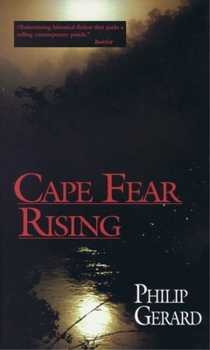Cape Fear Rising
Select Format
Select Condition 
Book Overview
In August 1898, Wilmington, North Carolina, was a Mecca for middle-class black citizens. Many of the city's lawyers, businessmen, and other professionals were black, as were all the tradesmen and stevedores. The black community outnumbered the white community by more than two to one. But the white civic leaders, many descended from the antebellum aristocracy, did not consider this progress. They looked around and saw working class white citizens out of jobs. They heard black citizens addressing white neighbors "in the familiar." They hated the fact that local government was run by Republican "Fusionists" sympathetic to the black majority. Rumors began to fly. The newspaper office turned into an arsenal. Secret societies espousing white supremacy were formed. Isolated incidents occurred: a shot was fired through a streetcar bearing white passengers, a black cemetery was desecrated. This incendiary atmosphere was inflamed further by public speeches from an ex-Confederate colonel and a firebrand black preacher. One morning in November, the almost inevitable gunfire began. By the time order was restored, many of the city's most visible black leaders had been literally put on trains and told to leave town, hundreds of black citizens were forced to hide out in the city's cemetery or the nearby swamps to avoid massacre, and dozens of victims lay dead. Based on actual events, Cape Fear Rising tells a story of one city's racial nightmare--a nightmare that was repeated throughout the South at the turn of the century. Although told as fiction, the core of this novel strikes at the heart of racial strife in America. Philip Gerard is the author of five novels and eight books of nonfiction, including Down the Wild Cape Fear: A River Journey Through the Heart of North Carolina and The Patron Saint of Dreams , winner of the 2012 North American Gold Medal in Essay/Creative Nonfiction from The Independent Publisher . " A] complex and convincing . . . story that] smartly limns the tangled combination of economic, social and visceral elements that led Wilmington to violence . . . " --Publishers Weekly
Format:Paperback
Language:English
ISBN:0895871653
ISBN13:9780895871657
Release Date:January 1997
Publisher:Blair
Length:416 Pages
Weight:1.32 lbs.
Dimensions:1.1" x 6.0" x 9.0"
Customer Reviews
5 ratings
A lesson not be forgotten
Published by Thriftbooks.com User , 16 years ago
I wonder why this book is not on the reading list at all southern high schools. This type of incident should never been forgotten so oit will not happen again and again.
Walk the Historic Streets
Published by Thriftbooks.com User , 17 years ago
Wilmington, North Carolina, and its history came alive when I walked its streets recently. The river front, Lattimore House, the old cemeteries, Ann Street, Market Street and the beautiful trees captured the beauty of this old town. But as I walked the streets, the scenes from Philip Gerard's novel, CAPE FEAR RISING, flashed across my memory: These old streets filled with white racists. The secret societies sneaking to meetings to plan the deaths of hundreds of black leaders. The wild militia men in red shirts ready to kill "black birds." Yes, Wilmington's history from 1898 can still be felt on its streets and in its gorgeous historical buildings. That such a monumental racial atrocity of killing and burning had taken place here just over 100 years ago seems impossible. But it did. This book of fiction based on factual research, even though awkwardly written at times, is a must read. by Larry Rochelle, author of the mysteries Bourbon and Bliss, The Mephisto Diary and Ten Mile Creek
Great book!
Published by Thriftbooks.com User , 19 years ago
This book was excellent! In the beginning things seemed a little dry to me but it was not long before the story takes hold of you and you cannot put this book down! It is definitely sad to see how people were in the past, but nevertheless an excellent story to learn from.
The Truth Hurts
Published by Thriftbooks.com User , 22 years ago
This book is a prime example of how major events in history can go overlooked. These riots in Wilmington did not only affect the city but whole nation in dealing with race realtions. With the emergence of Jim Crow in America these riots just reaffirmed the old doctrine of white supremacy. The novel also shows how major a city Wilmington was at the turn of the century. Gerard sums of the events that took place in 1898 in a quote by Edmund Burke in 1789, "An event has happened, upon which it is difficult to speak, and impossible to be silent." This is true about a lot of American history. Check this book out you might come away with more than you bargain for.
Mind-blower
Published by Thriftbooks.com User , 23 years ago
This is one of those books that blows your mind by opening a new door on history. I wondered while reading of the incredible events chronicled in this book why my education had failed to teach of this. (There's an obvious reason: it's a shameful page in America's history.) The novel that surrounds the history is good, solid, but not superb. However, the book is worth reading for the history alone. You will not be disappointed. It will change you.






